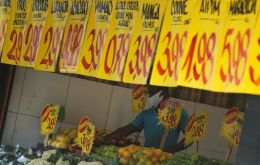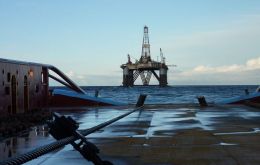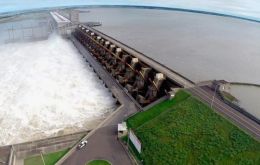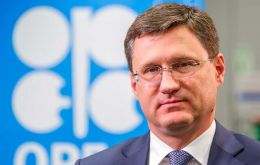MercoPress. South Atlantic News Agency
Energy & Oil
-
Wednesday, December 15th 2021 - 08:42 UTC
Argentina: Pipeline oil spill in Río Negro exceeded 3 million liters

Environment authorities in the Argentine province of Río Negro Tuesday confirmed the oil spill from the Oldelval pipeline in the past few days exceeded 3 million liters, while the company's remediation plan is still to be approved.
-
Tuesday, December 14th 2021 - 09:30 UTC
Ecuador decrees oil production under 'force majeure'

The Government of Ecuador has declared a situation of force majeure for the country's oil sector due to the effects of erosion in the Coca River, one of the tributaries of the Amazon basin.
-
Saturday, December 11th 2021 - 09:20 UTC
Brazil 12 month inflation in November at an eighteen year record of 10,74%

Brazil's November inflation reached the highest in eighteen years, 10,74%, almost three times this year's central bank target (3,75%), but the rising trend seems to be flattening, according to the national stats office.
-
Thursday, December 9th 2021 - 09:49 UTC
Fresh air for Falklands' oil industry: Navitas to become operator with Rockhopper, and Harbour exits

Encouraging news for the Falkland Islands budding hydrocarbons industry. Rockhopper Exploration officially announced on Wednesday that it had reached a new agreement with Navitas Petroleum by which its potential farm-in portion of the Sea Lion project increases significantly, while the current holder of the majority share, Harbour Energy exits the undertaking.
-
Thursday, December 9th 2021 - 09:30 UTC
Brazil working to create a price stabilization fund for gasoline, diesel and LNG

The Brazilian government in coordination with Congress are working on the creation of a price stabilization fund for fuels in an attempt to isolate the country from the volatility of international prices of oil and refined products. The fund is to be financed mainly with a tax on oil exports, helping with stability to domestic prices of gasoline, diesel and liquid gas.
-
Thursday, December 9th 2021 - 09:00 UTC
World Bank approves Renewable Energy Project loans to Cabo Verde, Africa

The World Bank on Wednesday approved an International Development Association credit in the amount of US$3.5 million and an International Bank for Reconstruction and Development loan in the amount of US$ 3.5 million for the Renewable Energy and Improved Utility Performance Project (REIUP) for Cabo Verde in Western Africa.
-
Monday, December 6th 2021 - 09:00 UTC
OPEC+ Expects Large Oil Glut In Early 2022

By Tsvetana Paraskova for Oilprice.com – OPEC+ anticipates the global oil market to show a worse-than-previously expected surplus in the first quarter of 2022, according to an internal report seen by Reuters, which could give the group another reason to pause monthly supply additions.
-
Saturday, December 4th 2021 - 09:31 UTC
Argentina pays Paraguay part of the US $ 45 million of overdue Yacyretá energy

Argentina Friday paid Paraguay US $ 19 million for overdue Yacyretá energy, Nicanor Duarte Frutos, head of Paraguay's side within Yacyretá's Binational Entity (EBY) announced.
-
Thursday, December 2nd 2021 - 09:55 UTC
Guedes insists in privatizing Petrobras, since the world is heading for “a green and digital economy”

Brazilian economy minister Paulo Guedes underlined on Wednesday that the announced privatization plan of the government (some 100 companies) must include oil giant Petrobras because the “future is green” and in not so many years time the value of crude will be zero.
-
Tuesday, November 30th 2021 - 09:00 UTC
OPEC+ meets Thursday to decide January cuts; pre-pandemic oil output level expected to be reached in May

By Tsvetana Paraskova for Oilprice.com – All Russian oil companies have confirmed they can raise production to the levels before the pandemic if the alliance chooses to proceed with monthly increases in output, Russian Deputy Prime Minister Alexander Novak said on Monday.
